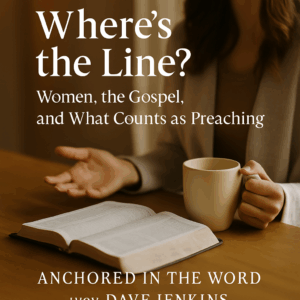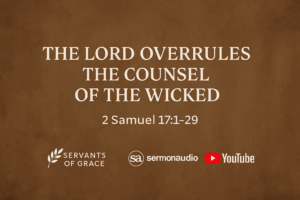⏱️ Estimated Reading Time: 9 min read
Sola Scriptura simply teaches that Scripture alone is our sufficient and supreme authority in matters of faith and practice. This is different, however, than saying that we believe in “Solo Scriptura”. Solo Scriptura is the belief that Scripture is our only authority, ever. Sola Scriptura, however, is the belief that there does, in fact, exist lesser authorities.
This means, at a very basic level, that the Christian who practices Sola Scriptura is not left to study his/her Bible alone or walk through this life with only the Bible in hand, while divorced from the many other helps of this life. On the contrary, God has blessed the Church at large with several helps and lesser authorities that help us to study, understand, and use the Bible in our day-to-day lives.
This article will simply seek to do one thing: List various ways (though not exhaustive) that the Christian, trusting in Sola Scriptura, can learn to rightly interpret and use the Bible.
One: The Christian Must be Filled with the Holy Spirit to Understand the Bible
This may seem almost an unnecessary step to include, but the truth is that the unregenerate cannot really begin to comprehend or understand the Scriptures. Someone unsaved may be able to act like a parrot and repeat particular teachings or doctrines they have learned elsewhere, but the mark of genuine understanding and knowledge, when it comes to Scripture, is knowing and loving Jesus and the truth of His Word. Such knowledge and love simply cannot be possible apart from faith, repentance, and the indwelling of the Holy Spirit. As Jesus said in John 16:13-15:
“When the Spirit of truth comes, he will guide you into all the truth, for he will not speak on his own authority, but whatever he hears he will speak, and he will declare to you the things that are to come. He will glorify me, for he will take what is mine and declare it to you. All that the Father has is mine; therefore I said that he will take what is mine and declare it to you.”
Being filled with the Holy Spirit is, genuinely, the first step to being able to interpret, understand, and use the Bible rightly. Subsequently, the indwelling of the Holy Spirit helps us to recognize all truth as God’s truth, no matter where we find it, which may help us to interpret Scripture better.
Two: The Christian Must Interpret Scripture with Scripture
It seems a simple thing to do, yet it is the most important step to understanding the Bible. Take, for example, just about any other book in existence. If you want to understand its plot, characters, and set pieces, do you open the book to any old page and start reading, hoping to piece it all together? Of course not! Books are read from beginning to end in order to make sure that the reader really understands and pieces together the plot as intended by the author.
So it is with God’s Word. We can only really begin to understand the Bible when we interpret Scripture with Scripture. We must compare the end to the beginning and the beginning to the end. Revelation 22 only really begins to make sense in light of Genesis 1, and everything else that comes in between.
The opposite also holds true; to understand why God created all things in Genesis, one needs to see the work of God through the Old Testament Prophets, the salvific work of Jesus on display in the Gospel accounts, and the finale of historical redemption towards which God is working, before He physically resurrects us and makes a new Earth and Heavens for us to dwell with Him forevermore in Revelation. This is why the Apostle Peter wrote:
“And we have the prophetic word more fully confirmed, to which you will do well to pay attention as to a lamp shining in a dark place, until the day dawns and the morning star rises in your hearts, knowing this first of all, that no prophecy of Scripture comes from someone’s own interpretation. For no prophecy was ever produced by the will of man, but men spoke from God as they were carried along by the Holy Spirit” (2 Peter 1:19-21).
Because all of Scripture was breathed by the Holy Spirit and produced by the will of God, all of it is important. It cannot be read, or understood, with only a few pieces in view. Every serious student of Scripture, and, indeed, every Christian, ought to make it their goal to read and study the whole Bible.
Three: The Christian Must Read and Listen to Expository Sermons
There are some Christians who are well-meaning enough when it comes to Sola Scriptura, but completely misunderstand the doctrine. They believe that, literally, all they need is themselves and their Bibles, and they will guide themselves into all truth.
We know, however, that this cannot be. First of all, as we already saw, we need the Holy Spirit. He is the one who grants us illumination and understanding of the Scriptures. So, the act of interpreting Scripture is, from the first step, decidedly not an act done in seclusion. We need God to lead us.
The problem is that we forget the truth that no man is an island unto himself. No man is perfect. We think ourselves so brilliant that any outside help is pointless, but the reality is that no man can master every single doctrine himself. For this reason, God has given us many helps, and one of the primary helps comes from those whom God has equipped to teach His Word. Consider Ephesians 4:11-16:
“And he gave the apostles, the prophets, the evangelists, the shepherds and teachers, to equip the saints for the work of ministry, for building up the body of Christ, until we all attain to the unity of the faith and of the knowledge of the Son of God, to mature manhood, to the measure of the stature of the fullness of Christ, so that we may no longer be children, tossed to and fro by the waves and carried about by every wind of doctrine, by human cunning, by craftiness in deceitful schemes. Rather, speaking the truth in love, we are to grow up in every way into him who is the head, into Christ, from whom the whole body, joined and held together by every joint with which it is equipped, when each part is working properly, makes the body grow so that it builds itself up in love.”
Pastors, preachers, and teachers serve the purpose of helping us to mature in the faith through careful expositions of God’s Word. It is true that all are called to study God’s Word, as 2 Timothy 2:15 makes clear: “Do your best to present yourself to God as one approved, a worker who has no need to be ashamed, rightly handling the word of truth.” However, not all have the same giftings and abilities. God has especially equipped our pastors to teach us God’s Word so that we can learn to become better students, interpreters, and appliers of the Bible in our own lives and homes.
This means, however, that the best sort of preaching, teaching, and commentary writing that we can seek to receive comes from those who utilize expository methods. These methods, in short, seek to understand God’s Word, verse-by-verse, by utilizing historical, grammatical, and Christological methods to find the genuine meaning of God’s Word, and then apply it to our own lives in extremely practical ways.
This is the very practice of the early Church that we see in Scripture. When Paul departed from the Ephesians, he declared to them that he “did not shrink from declaring to you the whole counsel of God” (Acts 20:27). Declaring the whole counsel of God’s Word requires expositional, verse-by-verse preaching, rather than topical sermons and hobby horses.
Four: The Christian Must Make Use of Church History, Creeds, and Systematics
Sola Scriptura still sees Scripture as the final authority, even as the Christian seeks to make certain that their interpretation and practices align with the major orthodox positions of Church history. One of the greatest helps afforded through a careful study of Church history is that the Christian is guarded from a plethora of errors and heresies that our spiritual ancestors have had to already walk through and combat themselves. Consider something like Christology—the study of Christ. What Christian today, left to their own devices, can formulate a complete, robust, biblical, and orthodox view of Christology totally on their own? Given many decades, perhaps some would be able to do it. Probably most would veer off into some heresy or another without knowing it. But the beauty of Church history is that, with decidedly less than decades of study, we can be helped to formulate that same complete, robust, biblical, and orthodox view of Christology that would have taken us decades on our own.
Creeds often act in the same way. If you were asked to define the Trinity, how would you do it? Could you even begin to do so on your own? But with something like the Athanasius Creed, we are helped to rightly interpret the Scriptures so that we can then begin to formulate the doctrine of the Trinity.
Systematics is, to some extent, the final step in our practice of Sola Scriptura biblical interpretation and practice, but a necessary one, all the same. As we move from Biblical theology to historical theology, and finally to systematic theology, we find that it is extraordinarily helpful to formulate doctrines into carefully designated and systematized orders.
For example, we can take texts like John 10:28-30, Romans 8:29-39, and Philippians 1:6 (amongst others), and place all these texts under the heading “Perseverance of the Saints”. While we should exercise some caution in trying to make sure that we don’t begin to read Scripture through the interpretive lens of systematics only, carefully constructed systematic theology helps us to succinctly summarize our faith to others in biblically meaningful ways.
As we follow these steps, we continue to recognize this one simple truth: Scripture alone, as God’s Word to us, is our final authority. Our goal is to simply understand it and apply it rightly to our lives for the glory of God alone. All else, including the tools we use to do so, are subject to Scripture’s final authority.
Jacob Tanner is a husband, father, and pastor, living in Pennsylvania. Holding to the 1689 Second London Baptist Confession of Faith, Jacob is focused on both evangelism and reformation. He is the founder of the Sound of Truth Ministries, where they have regular podcasts and preaches whenever the opportunity arises. His passion and motto are, “To know Christ and make Him known because He has made us His own.” He can be found spending time with his family or with a book in his hands in his free time.




